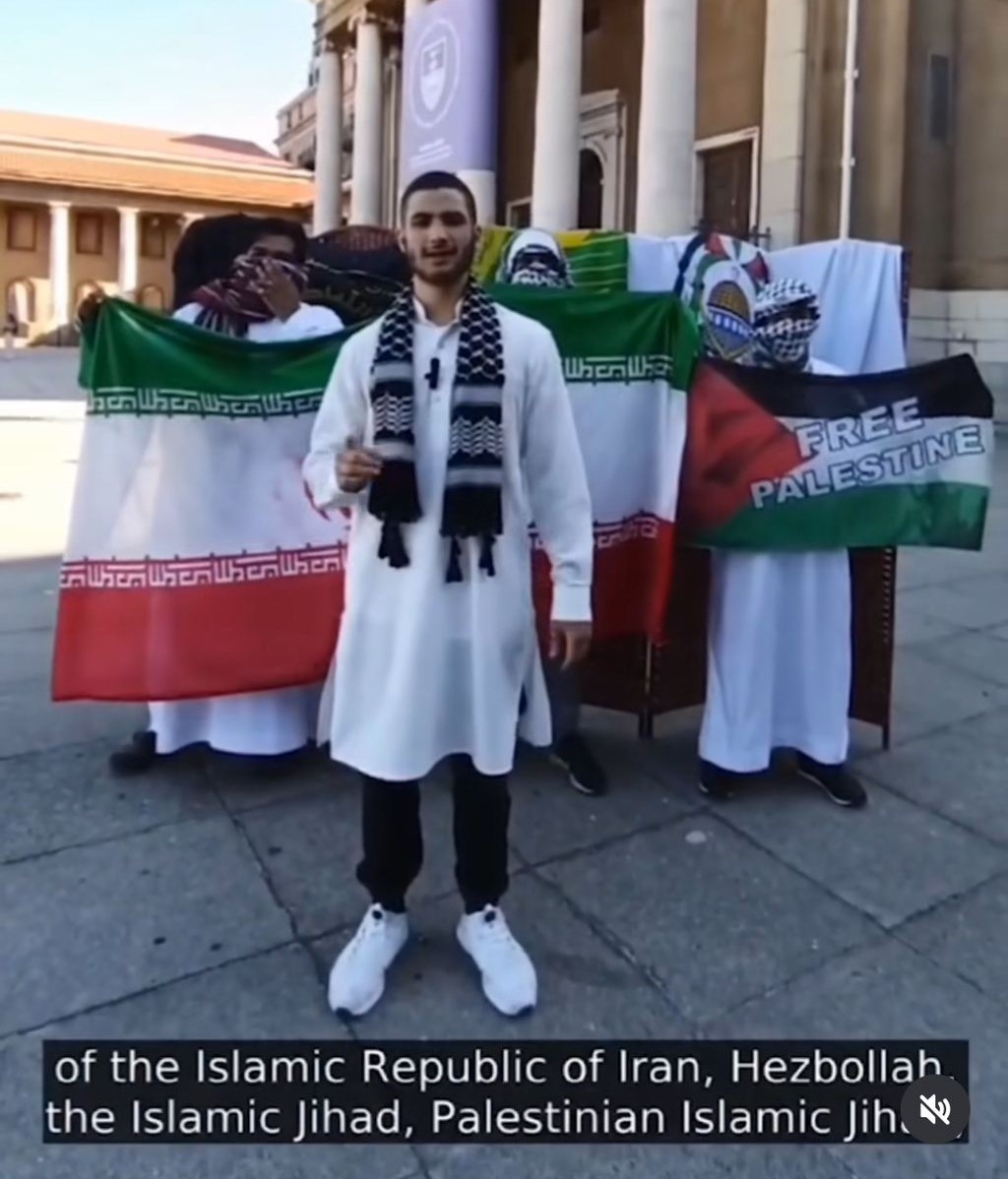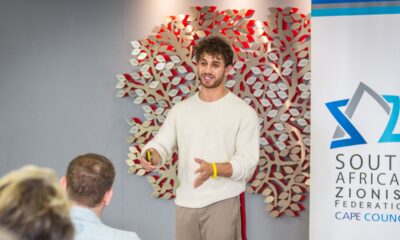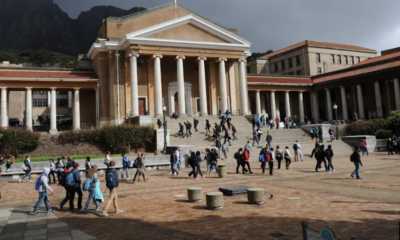
News

UCT students’ pro-Palestinian encampment attempt – a damp squib
The anti-Israel lobby at the University of Cape Town (UCT) threatened to create its own pro-Palestinian encampment on campus from Monday night, 6 May, but it didn’t materialise.
“Apparently, 30 students arrived [to take part in an encampment] but then left,” said a Cape Town source who could not be identified. UCT spokesperson Elijah Moholola told the SA Jewish Report that “UCT wasn’t formally made aware of any encampment planned to take place on campus on Monday, 6 May 2024.”
This follows two anti-Israel motions adopted by the university’s senate on 19 April. The first rejected the widely adopted International Holocaust Remembrance Alliance (IHRA) definition of antisemitism, among other points. The second maintained that “no University of Cape Town academic may enter into relations, or continue relations with, any research group and/or network whose author affiliations are with the Israel Defense Forces [IDF], and/or the broader Israeli military establishment”.
At the time, an observer, who also requested anonymity, said there was “serious intimidation of staff” by protesters outside the UCT senate meeting, with calls for “intifada revolution”. The vote was done by a paper ballot at a public gathering. A similar motion was put to the senate of Stellenbosch University, but it was voted down.
The adoption of the two UCT motions, which are now resolutions of the senate, will next be put to the UCT council – the institution’s highest decision-making body – for consideration.
On 25 April, four candidates campaigned for by the South African Jewish community were elected to the council. David Ansara, Brian Kantor, Mark Oppenheimer, and Kelly Phelps will serve from 1 July 2024 to 30 June 2028.
Erin Dodo, the chairperson of the South African Union of Jewish Students Western Cape, said that the senate passing a vote didn’t mean it was going to go through, and the council still had to approve it.
However, during the UCT senate meeting, those present claimed that “false facts” were presented about Israel, and attendees were forced to take part in a moment of silence for Palestinians. The pro-Palestinian lobby prevented the chairperson from speaking, and “it was a well-coordinated attack, with people feeling they must give [the pro-Palestinian lobbyists] a ‘win’. It was like negotiating with terrorists,” the observer said.
The extremist UCT Palestine Solidarity Forum (UCT PSF) dedicated the “victory” of the passing of the two motions to “the axis of resistance: the Islamic Republic of Iran, Hezbollah, Palestinian Islamic Jihad, Hamas, and the Ansarullah [Houthis] of Yemen”.
The observer said that at the senate meeting, Palestinian lobbyists wouldn’t let anyone speak, and “there seemed to be a real sticking point over which definition of antisemitism to use. Someone asked if the Jewish Studies professor could explain the definitions, and they got shouted down. People said they didn’t even know the content of the definitions, and they got shouted down. It was a profoundly anti-intellectual meeting.”
Dodo, says her organisation is “working closely with the South African Jewish Board of Deputies [SAJBD], which is in communication with the university, and we are as well.
“However, this once again adds to the growing distress of Jewish students. The thing that really concerned us was the UCT PSF’s reaction, which shows just how radical this organisation has become. If you look through the comments [on Instagram] you can see that a lot of Palestinian supporters are beginning to distance themselves from the [radicalism of] the UCT PSF.
“Jewish students are obviously feeling alienated and isolated on campus at the moment, and it’s up to council to rectify this,” she says.
Jeffrey Bagraim, a professor of organisational psychology who is a member of the senate, says the protests outside the senate meeting were “orchestrated by dedicated activists with the support of the Economic Freedom Fighters-aligned student representative council”.
Council may well decide to reject, accept, or refer the motions back to the senate, Bagraim says, but “even if passed, there will likely be little or no substantive implications. UCT didn’t subscribe to the IHRA definition before the meeting. No known UCT research has been conducted with Israeli researchers whose primary affiliation is with the IDF or related military bodies. The primary outcomes of the resolutions may be that they provided an opportunity for virtue-signalling, grandstanding, and the accumulation of ‘activist credits’ by its proposers.”
David Benatar, emeritus professor of philosophy, says, “The latter motion, if endorsed by UCT’s council, would require even those UCT academics who want to have academic relations with Israelis, to boycott them. If UCT were to impose such a boycott, it might find itself on the receiving end of a boycott by entities with much more power than UCT has.
“If the council was to pass the motion, the policy might still fall foul of the right to academic freedom enshrined in the South African Constitution,” he says. “Of course, enforcing that right would require legal challenge to the policy, and even then, it would remain to be seen whether such a challenge would be fairly adjudicated.”
Political commentator Sara Gon says the first resolution is “antisemitic and counter-factual” and “the impact on Palestinian education is, frankly, an entirely expected outcome of the war”.
Regarding academics working with anyone affiliated to the IDF, she says, “We don’t know if the drafters really mean working with most Israeli citizens, because the IDF is a conscript army so most would be ‘members of the IDF’.
“The most worrying thing about the success of these two resolutions is that they took place at an in-person meeting,” says Gon. “In the appalling atmosphere of the anti-Israel and anti-Jewish protests on campus and within academia including the senate, being in-person may have meant that academics who may have voted against one or both resolutions didn’t attend the meeting.
“The shouting down of pro-Israel participants at the vote and the aggressive incivility that represents anti-Israeli debate probably explains the result of the vote more than the content of the resolutions themselves.”
Daniel Bloch, the executive director of the Cape South African Jewish Board of Deputies, who is in regular communication with UCT and Stellenbosch leadership, says, “We’ll continue to monitor the situation and engage on behalf of our community.”
Says Bagraim, “This is a difficult time for many Jewish students worldwide. The community should remember that UCT is the leading university in Africa, providing a world-class education to its students, and only a tiny minority of students are involved in the protests. The leadership of UCT isn’t antisemitic, though it should do more in response to antisemitic acts and speech. Jewish students are safe on campus, and UCT has the best kosher food of any South African university.”











Gary
May 9, 2024 at 5:01 pm
Despite the rage and fury the Satanic evil of the pro=Palestine hard left and Islamists will be defeated. G-D Bless Israel. G-D bless the free world. No surrender to evil ever!